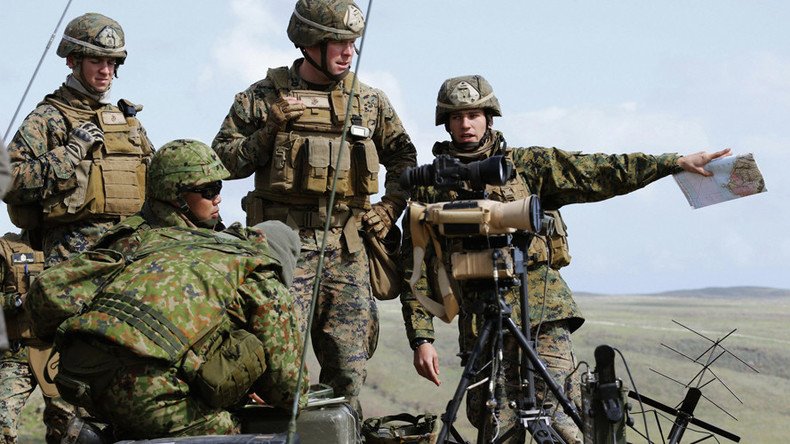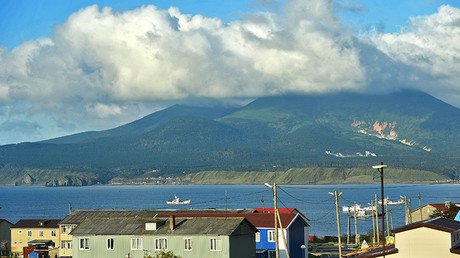Trump to seek support from Japan in countering China’s growing influence – adviser

The US president-elect will likely seek to gain Tokyo’s support in countering China’s rising influence in Asia despite existing rift over Japanese funding for American troops stationed in that country, according to Donald Trump’s security adviser.
A meeting between Trump and Japan’s Prime Minister Shinzo Abe in New York next Thursday may include discussing tougher stance on China which seeks to extend its influence over Southeast Asia, Reuters reported on Friday.
Trump wants Japan “to play a more active role in Asia,” a security adviser for the US president-elect who chose not to disclose his identity, told Reuters.
He added that Abe, was “a uniquely placed figure to offer leadership in the [US-Japan] alliance,” and the next US president would attempt to alleviate any “unfounded” concerns Abe may have and reassure his commitment to the countries' security alliance, the source added.
“This is going to be a respectful conversation,” he said.
During his presidential campaign, Trump argued that Japan and other Washington’s allies should contribute more into funding American troops stationed in these countries, otherwise threatening a complete withdrawal.
Close military-to-military ties between the long-standing allies may be strained by a dispute over Tokyo’s funding of the US forces in Japan. Top officials in Tokyo insist the funding is sufficient and covers three-quarters of the cost, according to Reuters.
Defense Minister Tomomi Inada stressed on Friday that Japanese contribution, amounting nearly 200 billion yen ($1.9 billion) a year in the so-called host-nation support for 50,000 US troops, cannot be bigger.
“I believe it's enough. We pay what we are supposed to cover,” Inada was quoted by the AP.
However, the Reuters source said, Trump would end defense spending cuts and propose a budget that would include building dozens of new navy vessels to “send a message to Beijing as well as allies Japan and South Korea and other nations that the US is intent on being in [Asia] for a long time.”
Japan boosts ‘logistics’ cooperation with US military amid tensions with China & N. Korea
The bid to step up military cooperation countering China may sit well with Abe’s hawkish defense policy. One of the most controversial points advocated by the PM includes the removal of a constitutional ban on the Japanese military to deploy abroad, a pacifist provision set out after the WWII.
A number of laws amending Article 9 of the Japanese constitution entered into force in March allow the country to engage in collective self-defense to help an ally under attack. The amendment has also significantly expanded the scope of the Self-Defense Forces’ foreign operations.
Adding to a growing concern that Japanese forces would be used in case of an overseas invasion, Tokyo is building up and developing its Marine expeditionary units as well as Navy’s amphibious capabilities. According to the Stars and Stripes, Japan expects its 2,100-strong Amphibious Rapid Deployment Brigade to be combat-ready by March 2018.
The developments prompt some observers to argue that Japan prepares to raise stakes in an ongoing dispute with China over disputed islets, called Senkaku in Japanese and Diaoyu in Chinese.
Tokyo to review ‘one-sided’ privileged status of Americans working at US bases in Japanhttps://t.co/ftoKZOKOeOpic.twitter.com/qVnCs385mU
— RT (@RT_com) 4 июля 2016 г.
The islets lie at a considerable distance off the Japanese shores and may require allocating naval and expeditionary forces to boost military presence in the contested territories.
On Friday, the US and Japan staged a complex field exercise featuring air, land and naval forces training amphibious and jungle operations on an island of Tinian, notable because the atomic bombs dropped on Hiroshima and Nagasaki in 1945 were loaded on to planes there.
The war games featured a scenario requiring US and Japanese troops to retake an island and clear enemy positions on it, Stars and Stripes reported. Taking place in the exercise were the Japanese helicopter carriers Hyuga and Osumi leading a four-ship force augmented by the landing dock ship USS Comstock.
Ties between China and Japan, the world’s second- and third-largest economies respectively, have been strained due to the territorial row, the legacy of Japan’s wartime occupation of sizeable parts of China and geopolitical rivalry.













